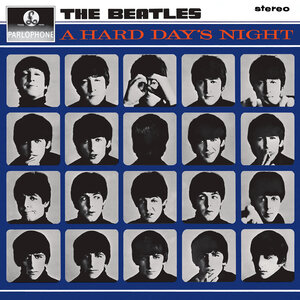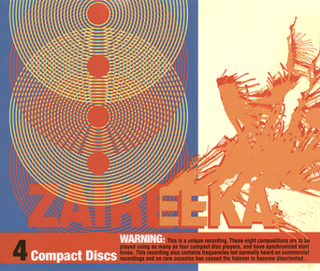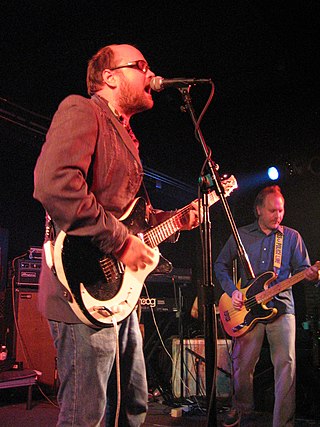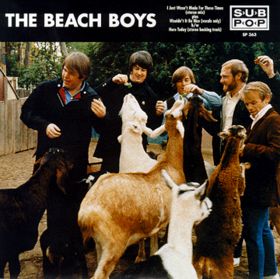Stereo , or stereophonic sound, is the reproduction of sound using two or more independent audio channels.
Contents
Stereo or stereophonic may also refer to:
Stereo , or stereophonic sound, is the reproduction of sound using two or more independent audio channels.
Stereo or stereophonic may also refer to:
Euphoria is an emotional and mental state defined as a sense of great happiness and well-being.
Opus is a Latin word meaning "(a result of) work". Italian equivalents are opera (singular) and opere (plural).

A Hard Day's Night is the third studio album by the English rock band the Beatles, released on 10 July 1964 by Parlophone, with side one containing songs from the soundtrack to their film of the same name. The American version of the album was released two weeks earlier, on 26 June 1964 by United Artists Records, with a different track listing that included selections from George Martin's film score. In contrast to the Beatles' first two albums, all 13 tracks on A Hard Day's Night were written by John Lennon and Paul McCartney, showcasing the development of their songwriting partnership.
Mono may refer to:

Pet Sounds is the eleventh studio album by the American rock band the Beach Boys, released on May 16, 1966 by Capitol Records. It was initially met with a lukewarm critical and commercial response in the United States, peaking at number 10 on the Billboard Top LPs chart. In the United Kingdom, however, the album was lauded by critics and reached number 2 on the Record Retailer chart, remaining in the top ten for six months. Promoted there as "the most progressive pop album ever", Pet Sounds was recognized for its ambitious production, sophisticated music, and emotional lyrics. It is now considered to be among the greatest and most influential albums in music history.

Stereophonics are a Welsh rock band formed in 1992 in the village of Cwmaman in the Cynon Valley, Wales. The band consists of Kelly Jones, Richard Jones, Adam Zindani, Jamie Morrison and touring member Tony Kirkham (keyboards). The group previously included Stuart Cable (1992–2003) and then Javier Weyler (2004–2012) on drums. Stereophonics have released twelve studio albums, including eight UK number one albums. A successful compilation album, Decade in the Sun, was released in November 2008 and charted at number two on the UK Album Chart.

Hooverphonic is a Belgian band that was formed in October 1995. Though originally categorised as a trip hop group, they quickly expanded their sound to the point where they could no longer be described as a singular genre, but rather encompass alternative, electronica, electropop, rock and a mixture of others. The band originally called themselves Hoover, but later changed their name to Hooverphonic after discovering other groups were already using the Hoover name and to avoid any legal issues with the vacuum cleaner company.
The Gift(s) may refer to:

Monaural or monophonic sound reproduction is sound intended to be heard as if it were emanating from one position. This contrasts with stereophonic sound or stereo, which uses two separate audio channels to reproduce sound from two microphones on the right and left side, which is reproduced with two separate loudspeakers to give a sense of the direction of sound sources. In mono, only one loudspeaker is necessary, but, when played through multiple loudspeakers or headphones, identical signals are fed to each speaker, resulting in the perception of one-channel sound "imaging" in one sonic space between the speakers. Monaural recordings, like stereo ones, typically use multiple microphones fed into multiple channels on a recording console, but each channel is "panned" to the center. In the final stage, the various center-panned signal paths are usually mixed down to two identical tracks, which, because they are identical, are perceived upon playback as representing a single unified signal at a single place in the soundstage. In some cases, multitrack sources are mixed to a one-track tape, thus becoming one signal. In the mastering stage, particularly in the days of mono records, the one- or two-track mono master tape was then transferred to a one-track lathe used to produce a master disc intended to be used in the pressing of a monophonic record. Today, however, monaural recordings are usually mastered to be played on stereo and multi-track formats, yet retain their center-panned mono soundstage characteristics.

The Apples in Stereo are an American indie rock band associated with Elephant 6 Collective, a group of bands also including Neutral Milk Hotel, the Olivia Tremor Control, Elf Power, Of Montreal, and Circulatory System. The band is largely a product of lead vocalist/guitarist/producer Robert Schneider, who writes the majority of the band's music and lyrics. Currently, The Apples in Stereo also includes longstanding members John Hill and Eric Allen (bass), as well as more recent members John Dufilho (drums), John Ferguson (keyboards), and Ben Phelan (keyboards/guitar/trumpet).
Traffic is road users including pedestrians and vehicles using the public way for purposes of travel.

Zaireeka is the eighth studio album by the American rock band the Flaming Lips, released on October 28, 1997, by Warner Bros. Records. The album consists of four CDs designed so that when played simultaneously on four separate audio systems, they would produce a harmonic or juxtaposed sound; the discs could also be played in different combinations, omitting one, two or three discs. Each of its eight songs consists of four stereo tracks, one from each CD. The album's title is a portmanteau of two words: Zaire, chosen as a symbol of anarchy after Wayne Coyne heard a radio news story about the political instability of the African nation, and Eureka, an expression of joyous discovery.

Stereophonic sound, or more commonly stereo, is a method of sound reproduction that recreates a multi-directional, 3-dimensional audible perspective. This is usually achieved by using two independent audio channels through a configuration of two loudspeakers in such a way as to create the impression of sound heard from various directions, as in natural hearing.
The Good Life or Good Life may refer to:

Greatest Hits is a compilation album by the American group Sly and the Family Stone. It was first released on November 21, 1970, by Epic Records. The album includes all of the singles from the albums Dance to the Music (1968), Life (1968), and Stand! (1969).

Robert Peter Schneider is an American musician and mathematician. He is the lead singer, songwriter, guitarist and producer of rock/pop band the Apples in Stereo and has produced and performed on albums by Neutral Milk Hotel, the Olivia Tremor Control and a number of other psychedelic and indie rock bands. Schneider co-founded The Elephant 6 Recording Company in 1992. He received a PhD in mathematics from Emory University in 2018. As of September 2022, he is an Assistant Professor of Mathematical Sciences at Michigan Technological University.
A revolver is a type of firearm.
Feel may refer to:

Soda Stereo was an Argentine rock band formed in Buenos Aires in 1982. The band's membership consisted of singer-guitarist Gustavo Cerati, bassist Zeta Bosio and drummer Charly Alberti. During their career, the band released seven studio albums before disbanding in 1997.

"I Just Wasn't Made for These Times" is a song by American rock band the Beach Boys from their 1966 album Pet Sounds. Written by Brian Wilson and Tony Asher, the lyrics describe the disillusionment of someone who struggles to fit into society. Musically, it is distinguished for its melodic bass guitar, layered vocals, and Electro-Theremin solo, marking the first time the instrument was used in popular music and the first time theremin-like sounds were used on a rock record.